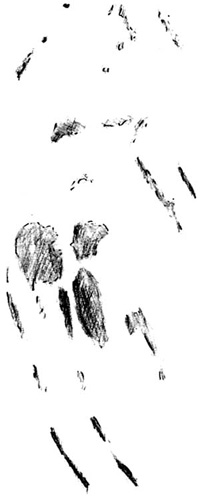
BEING JEAN-LUC MARION
"And yet, phenomenological ‘erotica’, if you wish (desire) ... as compensation for that absent, critical-poetical nothing much at all (which is at risk every day, anyway) ..." ... That is, then, embracing the shape, length, color, curve, swerve, tone, call of Things to Come ...


EXCERPT / "BEING JEAN-LUC MARION"
"A coupling between the given and the gifted (the witness), and never a matter of who comes, but what ... in simultaneity ... Saturated phenomenon seduces the ‘I’ ... lays waste to the eye ... bedazzling ... Its arrival, in time and space (including, or privileging even, the screen of dark imagination), inhabits (and gives to the self itself, its Self) the ‘moist’, fertile ‘plane’ (crescent) of the representational ‘field’ of imagination (and, yes, cognition) ... waning / waxing ... It cognizes (re-cognizes) itself ... It (itself, procreating the /S/elf lost-and-found, over time immemorial, of the gifted, the one whom responds / receives ... and re-creates) ..."
 To proceed to the essay, cliquez ici (RTF / 39 KB) ...
To proceed to the essay, cliquez ici (RTF / 39 KB) ...SELECT BIBLIOGRAPHY / MIXED AFFECTS
FORTHCOMING, EN ANGLAIS (12/2006) - Jean-Luc Marion, The Erotic Phenomenon [Le phénomène érotique, 2003], trans. Stephen E. Lewis (Chicago: University of Chicago Press, 2006) - Cloth, 248 pages, ISBN 0-226-50536-7
Ian Leask (ed.), Givenness and God: Questions of Jean-Luc Marion (New York: Fordham University Press, 2005) - Paper, 346 pages, ISBN 0-823-22451-1 / Robyn Horner, Jean-Luc Marion; a Theo-logical Introduction (Williston, VT: Ashgate, 2005) - Paper, 222 pages, ISBN 0-754-63661-5
In Excess: Studies of Saturated Phenomena (Perspectives in Continental Philosophy, No. 27), trans. Robyn Horner, Vincent Berraud (New York: Fordham University Press, 2002) - Cloth, 224 pages, ISBN 0-823-22216-0 - "In Excess: Studies of Saturated Phenomena is the third book in Jean-Luc Marion's phenomenological trilogy that includes Reduction and Givenness and Being Given. Marion renews his argument for a phenomenology of givenness, with penetrating analyses of the phenomena of event, idol, flesh, and icon. With an eye turned more explicitly than ever before to hermeneutical dimensions of the debate, Marion masterfully draws together issues emerging from his close reading of Descartes and Pascal, Husserl and Heidegger, Lévinas and Henry. Concluding with a revised version of his response to Derrida, 'In the Name: How to Avoid Speaking of It', Marion powerfully re-articulates the theological possibilities of phenomenology. Flowing at a breathtaking pace, In Excess is Marion writing at his very best, and readily illustrates why he has been described as one of the world's most important living philosophers." (Fordham University Press) / "Jean-Luc Marion, qui a succédé à Emmanuel Levinas à la Sorbonne et à Paul Ricoeur à l'Université de Chicago, a profondément marqué la philosophie française de ses trente dernières années par une oeuvre située à la croisée de l'histoire de la philosophie, de la théologie et de la phénoménologie. Ses trois livres principaux sur Descartes, Sur l'ontologie grise de Descartes (1975), Sur la théologie blanche de Descartes (1981), Sur le prisme métaphysique de Descartes (1986) ont renouvelé les études cartésiennes en soustrayant la pensée de Descartes à une approche purement épistémique et en réinscrivant l'oeuvre du philosophe français dans le mouvement de l'histoire de l'être, tout en soulignant les limites du schème onto-théologique heideggérien pour en appréhender le statut et les contours. Son travail théologique, inauguré par L'idole et la distance (1977) et poursuivi dans Dieu sans l'être (1982) a consisté à interroger la possibilité d'arracher la pensée de Dieu à l'horizon de la question de l'être et à l'idolâtrie métaphysique qui la sous-tend: la 'mort de Dieu', dans cette perspective, ne signifie plus la fin du christianisme, mais le retrait même par lequel Dieu se manifeste à nous à l'époque du nihilisme, et la source renouvelée à laquelle la théologie peut et doit puiser sa propre possibilité. Enfin, la phénoménologie de la donation inaugurée par Réduction et donation (1989) et poursuivie dans Etant donné (1997) et De Surcroît (2001) -- enfin, plus récemment, dans Le phénomène érotique (2003) -- s'efforce de soustraire la question de la phénoménalité au double horizon de l'objectivité (Husserl) et de l'être (Heidegger). C'est ce dernier aspect de l'oeuvre de Jean-Luc Marion, désormais salué et traduit dans de nombreux pays, qui fait plus particulièrement l'objet de ce numéro. Par un examen minutieux et critique de certaines de ses thèses, il voudrait contribuer à la connaissance de ce philosophe désormais incontournable." (Éditions de Minuit) / Regarding Jean-Louis Chrétien, vis-à-vis 'le tournant théologique', see "Endnotes" in the preceding critique ... / See also, Marion @ l'Université de Paris-IV and École doctorale V: Concepts et langages (Université de Paris-IV, Sorbonne) ... / Lastly, see Marion's "L'Interloqué", in Eduardo Cadava, Peter Connor, Jean-Luc Nancy (eds.), Who Comes After the Subject? (London: Routledge, 1991), pp. 236-245, a summary judgment of the radical élan of post-phenomenology ... / More Chrétien (Yellow Pages) ...
 Jean-Luc Marion, Cartesian Questions: Method and Metaphysics (Chicago: University of Chicago Press, 1999) - "Reflecting the uniquely French melding of phenomenological philosophy and theology, Jean-Luc Marion's works on Descartes have established him as one of the most authoritative scholars in the field.
Cartesian Questions comprises Marion's most detailed studies of Cartesian thought, focusing on the relation between method (the Discourse)
and metaphysics (the Meditations)." (University of Chicago Press)
Jean-Luc Marion, Cartesian Questions: Method and Metaphysics (Chicago: University of Chicago Press, 1999) - "Reflecting the uniquely French melding of phenomenological philosophy and theology, Jean-Luc Marion's works on Descartes have established him as one of the most authoritative scholars in the field.
Cartesian Questions comprises Marion's most detailed studies of Cartesian thought, focusing on the relation between method (the Discourse)
and metaphysics (the Meditations)." (University of Chicago Press)THE CALL - “After the subject, even beyond Dasein [radical subjectivity itself], emerges the one who knows how to hear Being’s claim.” (p. 242) / “This heroic reversal is marked, among other innovations, by the disqualification of Dasein’s autarky [autonomy]; since anticipatory resoluteness, as the self’s appeal to itself, runs aground on ontological neutrality, it must submit to an appeal that it neither performs, nor controls, nor decides: […] the appeal by which Being claims Dasein as the phenomenological agency of its manifestation […]” (p. 241) / “Being is disclosed to Dasein only as a possibility reserved for the one who engages himself by naming himself as an irreplaceable first person [a time-in-itself].” (p. 237) / “Dasein fails to constitute an object, but exposes itself to manipulation […] Dasein has no substantiality, but arrives at its own Being only by taking the risk of exposure in person.” (pp. 237-238) --Jean-Luc Marion, “L’Interloqué”, Eduardo Cadava, Peter Connor, Jean-Luc Nancy (eds.), Who Comes After the Subject? (London: Routledge, 1991), pp. 236-245 / Merciless (Soma) ...
'HARVEST YOUR SELF' / AUTO-TUTORIAL (04/10/05) - "Light without shadow allows the world to freeze, or to dissolve -- it doesn't matter which, precisely because a world demands a perspective. Only shadow establishes relief, delimits form, puts things in place [...] But precisely, in what way is Dasein itself found to depend on perspective? The thing must have a perspective precisely because perspective subsists, as the 'essentially explanatory [status] of Dasein', after the evaluation of the divine, that is, the idolatrous, projective [...] Only the vision (and therefore the infinity of competing or harmonious visions, like monads) of the world in perspective saves its appearances." Jean-Luc Marion, "Nietzsche", in The Idol and Distance, trans. Thomas A. Carlson (New York: Fordham, 2001), p. 39 - 1/ Pathway to The Dark Gaze (HTML / RTF) - 2/ Crossed Swords, The Anti-Anti-Theory Trilogy (HTML / RTF) - 3/ Good-bye Nihilism, The So-Called Trouble With Nietzsche (HTML) - 4/ Essay in the Form of Notes, Sinister Perspectives (RTF) - 5/ Onto-Theology, Anyone?, Ontologie (HTML / PDF) - 6/ What is Radical Empiricism?, L + A = ???? (HTML) - 7/ The House-on-Fire, Linguistic Dust (HTML) ...
In the meantime, German Idealism Calling (Yellow Pages) ...
 "WHO CARES?" - Jean-Luc Marion, On Love and Phenomenological Reduction (PDF), New Arcadia Review (2004) ...
"WHO CARES?" - Jean-Luc Marion, On Love and Phenomenological Reduction (PDF), New Arcadia Review (2004) ...Descartes's Grey Ontology: Cartesian Science and Aristotelian Thought in the Regulae, trans. Sarah E. Donahue (South Bend, IN: St. Augustine's Press, 2004) - Cloth, 320 pages, ISBN 1-587-31176-3 - "By situating Descartes within the history of the discourse on being, Marion brings into relief the grey ontology that lies at the origins of Cartesian science. Grey because it is never made explicit; grey because its 'objects' are the impoverished shadows of Aristotelian 'things'; grey because it never takes the full measure of itself. Within this history, then, the Regulae inaugurates a new era, where Descartes's own metaphysics and his conception of the divine become profoundly ambivalent." (St. Augustine's Press) ...
AND - Jean-Louis Chrétien, The Unforgettable and the Unhoped For, trans. Jeffrey Bloechl (New York: Fordham University Press, 2002); Mark A. Wrathall (ed.), Religion after Metaphysics (Cambridge: Cambridge University Press, 2003) - "In this volume, leading philosophers in the United States and Europe address the decline of metaphysics and the space which this decline has opened for nontheological understandings of religion. The contributors are Richard Rorty, Charles Taylor, Jean-Luc Marion, Gianni Vattimo, Hubert L. Dreyfus, Robert Pippin, John D. Caputo, Adriaan Peperzak, Leora Batnitzky, and Mark A. Wrathall." (Cambridge University Press); Robyn Horner, Rethinking God As Gift: Marion, Derrida, and the Limits of Phenomenology (New York: Fordham University Press, 2001); John D. Caputo, Michael J. Scanlon (eds.), God, the Gift, and Postmodernism (Bloomington: Indiana University Press, 1999) - "Jacques Derrida, the father of deconstruction, engages with theologian Jean-Luc Marion on the questions of mystical theology and the gift. In addition to a transcript of this live debate from a 1997 Villanova meeting, other conference contributors push past the constraints of postmodernism which cast 'reason' and 'religion' in opposition, and in their essays seize the opportunity to question the authority of 'the modern' and open the limits of possible experience, including the call to religious experience." (Indiana University Press); Gregory L. Jones, Stephen E. Fowl (eds.), Rethinking Metaphysics (Cambridge: Blackwell, 1995); Michael B. Ewbank, "Of Idols, Icons, and Aquinas's Esse: Reflections on Jean-Luc Marion", International Philosophical Quarterly, Vol. 42, No. 2 (June 2002), pp. 161-175
EN PASSANT - "All paths through aesthetics, philosophy, metaphysics, religion, art, representation, psychoanalysis, phenomenology, theology, ideology, science, empiricism, rationalism, fantasy, neurosis, teleology, eschatology, love, mysticism, apophatic reduction, architecture, sonic sublimity (music), post-theory, instrumentality, criticism, etcetera lead back to things; to the real, the true, the recondite, the allusive thing and its milieu, or 'The Given'. As such, there is no other way out (through and/or beyond) that which always-already exists." --Dr. Prof. Ing. I. M. Avenarius, Bons Mots (London: Sub-Verso Press, 2005)
See also, The Given, The Taken, and The Given-Back (RTF) / Immodernity Itself (RTF) / Regarding the 'cosmogonic(al) parousia', cliquez ici (HTML) ...

